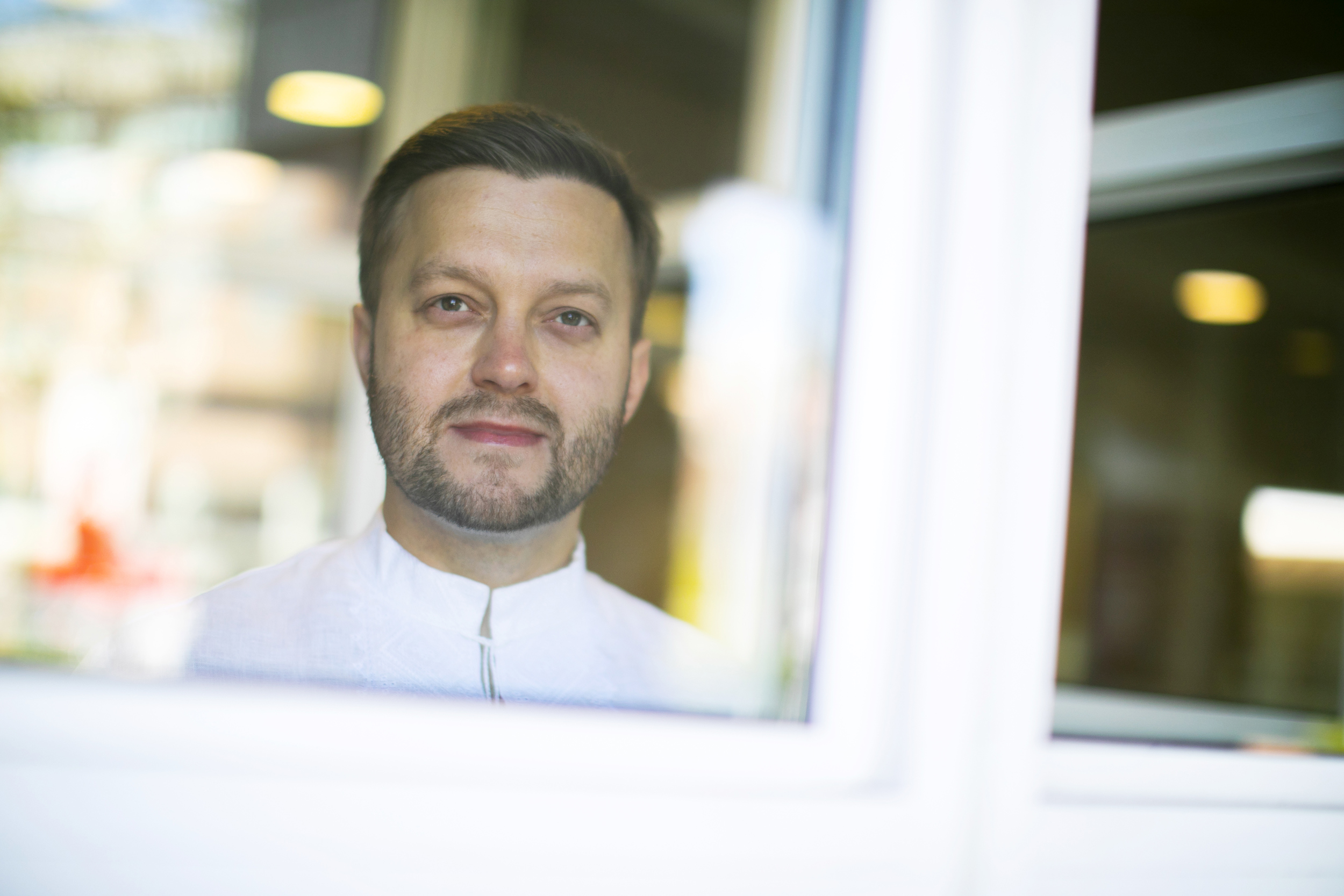
Stephanie Mitchell/Harvard Staff Photographer
Preparing to rebuild even as war with Russia rages
Deputy mayor of Kyiv struggles with decision, makes bet on better future in leaving homeland for training at Kennedy School
This story is part of a series of graduate profiles ahead of Commencement.
The Russian Army had encircled Kyiv, a highly prized target, by March of last year. Just an estimated 700,000 citizens remained of the Ukrainian capital’s prewar population of more than 3 million, and only a couple of safe routes out of the city remained. It was now Deputy Mayor Konstantin Usov’s responsibility to evacuate people from Kyiv and nearby cities like Bucha and Irpin.
Special forces had already set up fighting positions in City Hall offices, using Usov’s coffee table as a resting place for a fully loaded Javelin anti-tank missile. “We slept two or three hours a day, probably,” he said about the municipal officials and workers, just about all of whom had chosen to stay and keep doing their jobs. “The majority of us were just totally committed, ready to face whatever destiny was coming,” he said.
That’s when the acceptance letter arrived for a mid-career master’s program at Harvard Kennedy School.
“No way am I doing this now,” Usov recalled thinking.
But by May Ukrainian forces had held off a Russian advance, and the situation in Kyiv had stabilized. Kyiv’s mayor, Vitali Klitschko, a former heavyweight boxing champion, urged him not to pass up an opportunity to acquire knowledge that would be valuable to bring back and share when Kyiv and Ukraine begin rebuilding.
Usov had long planned to get additional training.
He first came to Harvard in 2019 for an executive education course to reset after spending five “toxic” years as a member of Parliament in Ukraine, which declared independence from the Soviet Union in 1991. Usov said that he knew instantly that he wanted to return to pursue a degree at the Kennedy School someday.
Two years later Usov had become deputy mayor, and it seemed like the right time to apply to graduate school. While he was waiting to hear whether he had gotten in, Russian troops crossed into Ukraine on Feb. 24, 2022, and everything was upended.
Usov recalled that a half hour after the war started, he and his City Hall colleagues were suddenly confronting a barrage of unimaginable calamities unfolding, improvising solutions with no time to spare. “It was crazy. We made 100 decisions an hour,” he said.
“I remember the first day. People got traumatized trying to enter the subway system because the crowds were too big. ‘OK, let’s make public transportation totally free starting now.’ We don’t have enough municipal buses because a lot of bus drivers are evacuating their families. What should we do? ‘Let’s post on social media and ask for volunteers to help operate our fleet of 1,500 buses and hand out keys to random people because we trust everyone now,’” he said, explaining how city officials scrambled to solutions as Russian tanks barreled toward Kyiv.
Now Usov had to decide whether he should leave Ukraine while the war raged to spend a year at the Kennedy School. He was deeply torn about whether it would be the right thing to do as a leader. Many Ukrainians in the U.S. told him they understood and appreciated his decision to come.
“They all told me, ‘Just know that a lot of people are waiting for you at home the same way they are waiting for our soldiers who are being trained in the U.S. to drive Abrams tanks or to operate Patriot anti-missile systems. You’re just getting back with different, but still very valuable knowledge,’” he said.
Staying on top of his obligations across two time zones with a seven-hour difference has been a struggle, said Usov, whose wife and two young sons joined him in Cambridge. But he is fully ready to resume his role as deputy mayor when he returns to Kyiv this summer with his master’s of public administration.
Usov said he’s been impressed by the heartfelt support ordinary Americans have shown for Ukraine and Ukrainians. He believes it is rooted in respect, inspiration, and a sense of shared democratic values, not simply antipathy toward Russia.
But he has not been shy about pushing back on misconceptions about ties between Ukraine, Russia, and their complicated history or on ideas hatched far from the battlefield about what compromises Ukraine should be willing to make in order to strike a peace deal with Russia.
“Even though my primary goal in coming here was not to preach, but to learn, I never missed the chance to challenge opinions in a productive way,” he said.
The experience of engaging with other students from very different professional and personal backgrounds, working together and learning from each other even when you don’t see eye to eye, Usov said, opened up a kind of “alternative diplomacy” students will bring back to their home countries that is “a real asset for the world.”




